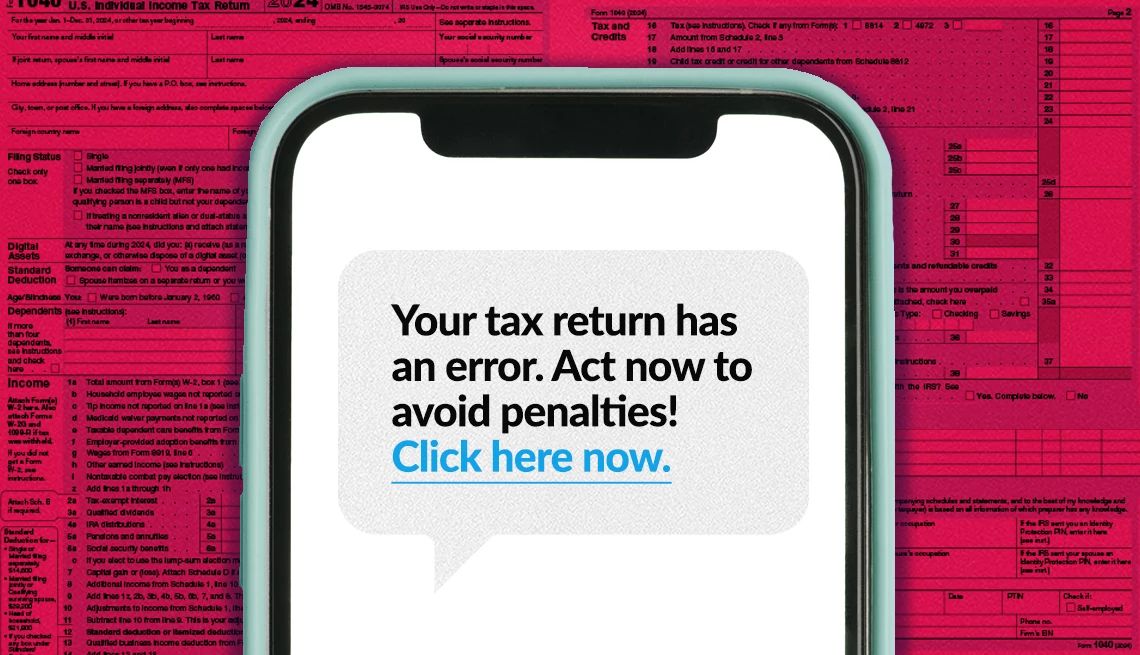
Irs: beware of these top tax season scams
- Select a language for the TTS:
- UK English Female
- UK English Male
- US English Female
- US English Male
- Australian Female
- Australian Male
- Language selected: (auto detect) - EN
Play all audios:

TAX REBATE SCAMS. Another scam involves scammers trying to steal personal information with promises of a federal rebate. They’re assisted by the fact that there is a legitimate rebate, where
the IRS is automatically providing $1,400 to taxpayers who didn’t claim the Recovery Rebate Credit on their 2021 returns. But most of these payments have already been sent. “[Criminals are]
sending fake IRS texts, claiming you need to ‘verify’ your information to receive your payment,” says Truman Kain, offensive security researcher at Huntress, a cybersecurity firm. “If you
click the link, you’re taken to a convincing but fake IRS website designed to steal your Social Security number, bank details, and other personal info. They’re running a numbers game,
blasting out texts, hoping someone bites.” SUBMITTING FAKE RETURNS IN A VICTIM’S NAME. Because of the huge number of data breaches, there’s a “heightened risk of fraudulent tax returns,”
says Keven Knull, CEO of TaxStatus, an IRS account monitoring platform for financial professionals. "Criminals can exploit stolen TINs [Tax Identification Numbers] to file fake returns,
often claiming large refunds long before the legitimate taxpayer even becomes aware.” If the criminal files a phony return before the taxpayer, then the IRS may not detect the fraud until
the legitimate return is filed, Knull explains. FIGHTING BACK Here are some ways to protect yourself: FILE EARLY. “One of the most effective ways to prevent tax fraud is to file your return
as early as possible, reducing the window of opportunity for identity thieves to submit a fraudulent return in your name,” says Cummings. Also, conversely, try to avoid tax extensions.
“Delaying tax filing increases the risk of fraudulent returns being submitted in your name, leading to lengthy disputes with the IRS to reclaim lost funds,” notes Knull. And if you’re
getting a refund, choose direct deposit rather than a check, advises Chase Bank. REQUEST AN IRS IDENTITY THEFT PIN. This six-digit personal identification number prevents someone from filing
a tax return with your Social Security number or individual taxpayer identification number. “The IRS will issue you a pin every year, and this pin will be required to file your taxes,” says
tax adviser Karla Dennis, CEO of Karla Dennis & Associates. To get one, create an online account at IRS.gov, where you can request an IP PIN or retrieve an existing IP PIN by using the
“Get an IP PIN” tool. The account also allows you to monitor filings, access tax records, and receive alerts about suspicious activity. And if someone offers to help you create an online
account, it’s likely another scam. “In reality, no help is needed,” the IRS states. Third parties often try to steal your personal information, submit fraudulent tax returns in your name,
and score a large refund. KNOW HOW THE IRS COMMUNICATES. Unless you have been in contact with the IRS about back taxes, the IRS will never call, text, or email you asking for personal
information or requesting payments. If you receive a call like this, hang up. And don’t click on links in emails or texts. The links could load malware or ransomware onto your computer or
device. “If you get an unexpected text about an IRS payment, it’s a scam. No exceptions,” says Kain. If the IRS suspects fraud in your name you will receive a letter from the Taxpayer
Protection Program (find out what that would look like here). KNOW HOW SCAMMERS COMMUNICATE. Tax scammers often use urgency, fear, and enticements (big refunds!) to manipulate victims. Nati
Tai, head of Guardio Labs, cites messages such as: * “Your tax return has an error. Act now to avoid penalties!” * “You’re eligible for a $1,500 tax refund. Click here to claim it.” * “The
IRS has flagged your account. Verify your information immediately to avoid legal action.”
